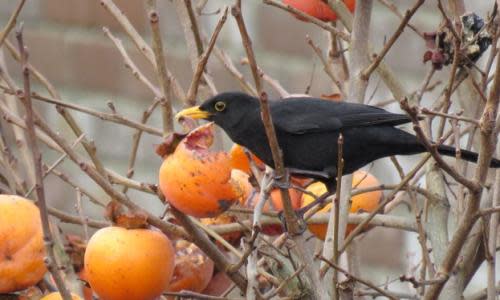Country diary: blackbirds feast on the food of the gods

When my neighbour, a keen plantsman, moved out last winter, the landlord razed the garden, dismantling the vine-laden greenhouse, chainsawing the apple and acer trees, and ripping from the fence the tapestry of clematis, honeysuckle and rambling roses.
The sole survivor was a scrubby persimmon. The tree existed in obscurity throughout spring and summer. But in autumn, it came to my attention again, when its leaves flamed red and gold. When they finally dropped, vibrant orange fruit were revealed, hanging from the bare branches like Christmas baubles.
Though persimmons are now a common sight on supermarket shelves, the hardy, self-fertile trees are rarely grown in British gardens. The fruit have the waxy, smooth-skinned appearance of oversized, squat tomatoes, and, like tomatoes, morphologically they are actually berries. The genus name, Diospyros, is often translated as “food of the gods”, but due to its high tannin content, the unripe fruit is mouth-puckeringly astringent and bitter. It wasn’t until mid-December, when the pale, custard-like flesh had softened and sweetened, that blackbirds began to flock every day to the laden boughs.
Male blackbirds establish a territory during their first winter, but their territorial drive is low at this time of year, so it’s common for birds to cross boundaries in search of an abundant food source. Resident individuals sporting matt-black breeding plumage, with bright yellow eye-rings and bills, were the first to arrive. But they were soon joined by brown-feathered females and several males with duller bills and no eye-rings – winter visitors from northern Europe.
As I watched one male enthusiastically peck the pulpy innards from a wizened outer shell, I wondered how persimmons taste to a blackbird. It’s fundamental for most birds to be able to detect bitter, to identify and avoid ingesting dietary toxins, but only a small number of species, such as hummingbirds and parrots, have the ability to perceive sweet tastes in a similar fashion to us. While the human mouth contains around 10,000 taste buds, birds possess far fewer – between 50 and 500, depending on the species. So though the blackbirds gorge with gusto, it’s unlikely that they savour the slightly earthy, honeyed tang of the fruit in quite the same way as I do.
• Country diary is on Twitter at @gdncountrydiary

 Yahoo Finance
Yahoo Finance 